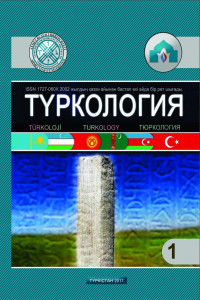PRESERVATION OF ETHNOCULTURAL AND LINGUISTIC IDENTITY IN THE ERA OF GLOBALIZATION
PRESERVATION OF ETHNOCULTURAL AND LINGUISTIC IDENTITY IN THE ERA OF GLOBALIZATION
Ethnic culture expresses its linguistic and cultural identity of the ethnic group, including the specific features of the material and spiritual culture, life, group psychological characteristics common identity based on the idea of their common origin. Ethnic culture, in addition, includes the language of the world of communication, which represents emerging in communications of various ethnic groups shared "communicative and cultural zones" - areas of global culture. In the culture of the ethnic group and the ethnic specific common worldwide languages coexist as represent different cultural layers.
Based on the above, ethnic and cultural identity can be determined as part of a multiple identity which is a socio-cultural construct, transmit awareness of the individual himself as a member of an ethnic group, the degree of mastery of the ethnic culture and language, the adoption of its values and unconditional adherence to them in practice. Becoming the global cultural space and the emergence of a global culture occurs on the basis of cultural values that are common to all the world's cultures. Although these values were in all cultures have always, however, the formation of a global culture of today occurs only during the information globalization of the world, when activated by the process of cultural interchange, leading to a deepening of the cultural self-development and enrichment at the expense of the development of a cultural experience.
Keywords:
Identity, Globalization, Ethnic culture, Language, Ethnic and cultural identity, Language identity, Individual, Cultural values, Mentality Multilingualism,
___
- 1. Баксанский О. Е., Лавринов Д. Г. Этнокультурная идентичность в условиях глобализации/Феномен глобализации в контексте диалога культур. –М.: «Канон +» РООИ «Реабилитация», -2010. С. 47-75.
- 2. Бауман З. Индивидуализированное общество. М.: Логос, 2002. 324 с.
- 3. Жаде З. А. Трансформация идентичности в условиях глобализации. /Человек – объект и субъект глобальных процессов: материалы междунар. науч. конф. / под. Ред. И.Ф. Кефели. СПб., 2009. С. 80-85.
- 4. Малинова О. Ю. Идентичность как категория практики и научного анализа: о различии подходов. /Права человека и проблемы идентичности в России в современном мире. под ред. О. Ю. Малиновой, А. Ю. Сунгурова. СПб.: Норма, 2005. С. 7-20.
- 5. Мелосик З., Шкудлярек Т. Культура, идентичность и образование: мерцание значений [Электронный ресурс]. URL: www.relga.ru/Environ/WebObiects/tgu-www.woa/wa/ Main? Tex-tid=2908&level1=main&level2=articles (дата обращения: 15.03.2011).
- 6. Федотова Н. Н. Идентичность. /Энциклопедия «Глобалистика». под ред. И. И. Мазура, А.Н. Чумакова. -М., 2003. С. 357.
- 7. Эриксон Э. Г. Идентичность: юность и кризис / пер. с англ. А. Д. Андреевой и др.; общ. Ред. И предисл. А.В. Толстых. –М.: Прогресс, -1996. -342 с.
- 8. Эриксон Э. Г. Идентичность и неукорененность в наше время // Философские науки. 1995. № 5-6.
- ISSN: 1727-060X
- Başlangıç: 2002
- Yayıncı: Hoca Ahmet Yesevi Uluslararası Türk-Kazak Üniversitesi
Sayıdaki Diğer Makaleler
ABOUT MEDIEVAL TURKIC MONUMENT "GULISTAN BIT-TURKI" BY SAIF SARAI
ON THE TEACHING TURKISH FOR FOREIGNERS
WORKS ON FOLKLORE OF I. DUYSENBAEVA
THEATRICAL AND ACTOR'S ELEMENTS IN NATIONAL CREATION
Karimbek SEYTMETOV, Aitkul SEYTMETOVA
Gulgaisha SAGIDOLDA, Asem KAYRATKYZY
Adyum RAFAILOV, Maria RAFAILOVA
TÜRKİYE TÜRKÇESİNDEN AZERBAYCAN TÜRKÇESİNE ÇEVİRİLERDE YAŞANAN BAZI SORUNLAR ÜZERİNE DEĞERLENDİRME
PRESERVATION OF ETHNOCULTURAL AND LINGUISTIC IDENTITY IN THE ERA OF GLOBALIZATION
UNDERSTANDING OF PEOPLE: THE PLACE AND THE ROLE OF NON-VERBAL COMMUNICATION MEANS
